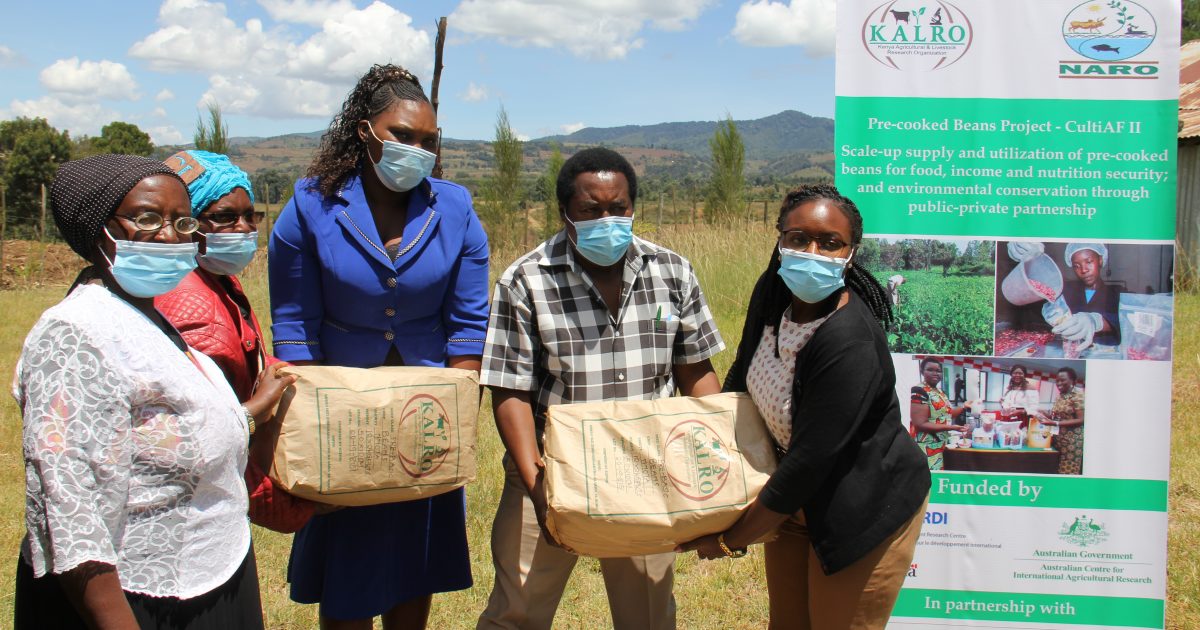The Kenya Agricultural and Livestock Research Organization (KALRO) and Nakuru County have embarked on promoting proper agronomical practices in farming of high yielding and disease resistant bean seed varieties with an eye on the export market.
The venture targets to rescue over 15,000 bean farmers in the county from poor markets by training them on the mandatory standards their produce is expected to meet in the European Union (EU) and other export markets.
KALRO’s National Coordinator for Grains and Legumes Dr David Karanja said adoption of high yielding and disease resistant seed varieties was crucial in enabling bean farmers harvest quality produce that can access international markets.
He said the bean varieties being propped up in the venture including Angaza, Metameta, Faida and Nyota are fast maturing and richer in nutrients and besides took between 15 and 27 minutes to cook compared to the traditional ones that took three hours.
Speaking during a training session for small holder farmer groups at Gituamba Village, within Kiambogo Location of Gilgil Sub-County, the National Coordinator for Grains and Legumes said participants were being enlightened on compliance with applicable laws and regulations to tap into the export market.
He said the bean varieties which have high iron and zinc content prevents stunted growth in children and boosts body immunity and has the potential of growing the country’s horticultural world market share.
Karanja noted that though a significant proportion of young farmers in the county were eyeing international markets, most were unaware of post-harvest treatment requirements and standards set by the EU and other marketing agencies.
“As we promote adoption of these seed varieties, we are also enlightening farmer groups on pre-harvest interval which is the time between applying fertilizer and harvesting- that is supposed to allow fertilizer to disintegrate to ensure low residual levels. We have been talking to farmers on the appropriate methods to use in order to contain the presence of quarantine pests and diseases in their produce to protect and grow our European market,” he affirmed.
The bean varieties he said are also a rich source of essential proteins which would lead to a healthy populace and were resistant to the vagaries of pest attacks and climate change.
The seeds were developed close to three years ago after scientists and breeders conducted tests on 47 bean varieties in Kenya and Uganda to determine the most suitable ones before they narrowed down to 4 varieties in Kenya and 8 from Uganda.
He said the core objective of the partnership was increasing rural households farming incomes by empowering youth and women with technical skills to venture into bean farming and improving the country’s food security and nutrition situation.
“Micronutrient deficiencies remain unacceptably high in Kenya. Zinc deficiency affects the entire population but is highest among children aged 6–59 months, at 83 per cent, with no significant difference between boys and girls. Anaemia and iron deficiency are higher among children under 5 and pregnant women and girls aged 15–49”
“According to statistics from Nakuru’s Department of Health, of the 275,921 children under five years living in the county, an estimated 27.9 per cent are stunted way above the national level of 26 per cent, a further 5 per cent are wasted while 10.2 per cent are underweight. The figures are unacceptable in a county considered as one of the food baskets in the country,” he stated.
Karanja noted that the long-term purpose of promoting the varieties was energy conservation and minimizing deforestation since it takes less charcoal to prepare the beans.
Though highly nutritious, the National Coordinator expressed concern that bean consumption in the country still remains low with an average Kenyan consuming between 50-60 kilograms per year. He attributed the low consumption on the tedious and long process of preparing bean meals.
Rachael Njenga, a Senior Agricultural Extension Officer at Nakuru County who is coordinating the programme said they partnered with different organizations and identified women who showed potential in farming.
She added that the programme targeted mainly women because most of them in rural parts of the devolved unit engaged in agri-business and easily combined it with other income-generating activities.
“There are many women who were yearning to acquire knowledge about the new seed varieties and we decided to bring it to rural households. The main criterion for choosing the beneficiaries was identifying the ones in a group so that they can share the knowledge with the rest through a structured system. Acceptance of the new varieties has improved tremendously,” she explained.
Njenga stated that Angaza, Nyota and Meta Meta take 75-84 days, 65-70 days and 75-84 days respectively to mature adding Angaza can give 2000kg per hectare, Nyota between 1400-2200kg per hectare and Meta Meta 2000kg per hectare.
Secretary to Ushirikiano Farmers Women Group Ms Lucy Wairimu said since 1960s most farmers in the region have been relying on traditional ‘Mwitemania’ and ‘Wairimu’ seed varieties which were low yielding and prone to diseases.
“For these traditional varieties one requires 90 kilograms of seeds to plant one acre. Adopting new varieties such as Nyota will save the farmer huge losses as an acre only requires 24 kilograms of planting material. Taking into account the varieties are disease and pest resistant, farming will be a lucrative venture for youth and women groups,” said the Secretary
She observed that a 90-kilogram bag of ‘mwitemania’ and ‘wairimu’ beans was retailing at Sh4500 as compared to Sh7500 that a 90-kilogram bag of the new varieties fetched.
Vice Chairperson of the farmer group Ms Cecilia Njau indicated that more than 100 women have so far benefited from the training adding some of those who were trained became trainers and have been moving around the location encouraging upcoming farmers to embrace the varieties.
“The new bean variety will go a long way in assisting in flour fortification as it is easily processed. This is an opportunity for both small and large-scale farmers to reap returns within the shortest time possible. A farmer can harvest between 400 kg and 700 kg from one acre. And prices of the beans would be higher by about 20 per cent when compared to the ordinary breeds in the market. The beans are preferred for export after packaging, canning and saucing,” Ms Njau stated.
Her sentiments were echoed by Ms Esther Gathoni who said when consumed the beans cannot cause flatulence unlike other varieties, and are also easy to prepare into snacks after pre-cooking.
By Anne Mwale and Dennis Rasto




